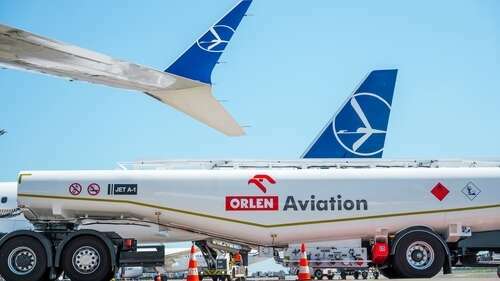ORLEN launches sales of new aviation fuel: SAF now available at Polish airports
Aircraft departing from airports in Warsaw, Kraków, and Katowice can now refuel with SAF, following ORLEN’s addition of the fuel to its commercial offering. The new type of aviation fuel significantly reduces greenhouse gas emissions, both during production and combustion.
"The inclusion of SAF in our aviation fuel portfolio marks another step in implementing our 2035 strategy. We are expanding our product portfolio while responding to the need to decarbonise operations on both the supply and demand side. SAF also meets the expectations of carriers and passengers seeking more sustainable travel options," said Ireneusz Sitarski, Vice President of the ORLEN Management Board, Wholesale and Logistics.
SAF (Sustainable Aviation Fuel) is produced from renewable or waste-derived feedstocks that meet established sustainability criteria and do not contribute to deforestation or the depletion of food and water resources. Depending on the production technology, feedstocks may include used cooking oils, as well as municipal, industrial, agricultural, and forestry waste. In practice, the renewable component is blended with regular jet fuel.
"The introduction of SAF at Warsaw Chopin Airport is a major milestone in the aviation sector’s transition toward climate neutrality. Our priority is to establish the conditions necessary for carriers to reduce emissions and progress their sustainability strategies. As PPL, we support initiatives that drive the decarbonisation of the aviation sector in accordance with our ESG strategy, as well as the development of environmentally sustainable technologies in air transport," said Adam Sanocki, Member of the Management Board of PPL S.A., Strategy and Marketing.
SAFs emit substantially fewer greenhouse gases than conventional aviation fuels, supporting the decarbonisation of the aviation sector. When produced using renewable energy sources, they enable a significant reduction in emissions across the entire value chain – from production through to combustion in aircraft engines. The fuel is fully compatible with existing jet engine technologies, enabling immediate adoption by airlines and a reduction in emissions from flight operations.
By introducing SAF into its commercial offering, ORLEN is also fulfilling the requirements of the EU ReFuelEU Aviation Regulation, which mandates that sustainable aviation fuels must account for at least 2% of total jet fuel sales in 2025. The regulation applies to airports within the European Union that, in the preceding year, handled over 800,000 passengers or 100,000 tonnes of cargo. ORLEN currently provides SAF refuelling services at three domestic airports: Warsaw Chopin Airport, Kraków, and Katowice.
"The introduction of SAF into the Polish market is an important step for us in the process of adapting to regulatory requirements stemming from the ReFuelEU Aviation regulation. Although access to SAF remains limited, its availability at selected airports in the country will significantly facilitate the implementation of LOT’s Sustainable Development and Decarbonization Strategy, in line with the company’s development plans. The deployment of such fuels requires precise logistical planning, which is why we appreciate ORLEN’s initiative, as it will undoubtedly support us in meeting the objectives of the EU requirements," said Dorota Dmuchowska, Chief Operating Officer, LOT Polish Airlines.
The ReFuelEU Aviation Regulation establishes a binding trajectory for increasing the share of SAF in total aviation fuel sales: 6% by 2030, 20% by 2035, and 70% by 2050. To meet these obligations, ORLEN is developing a hydrogenated vegetable oil (HVO) facility at its Płock refinery, which will enable the production of aviation fuel from used cooking oils. Until the facility becomes operational, the company sources SAF components from abroad.
The sale of SAF is one of several initiatives undertaken by ORLEN to advance the decarbonisation of aviation. As part of the HySPARK project (Hydrogen Solutions for euroPean Airports & Regional Kinetics), ORLEN also plans to construct a hydrogen refuelling station at Warsaw Chopin Airport. The station will supply hydrogen to zero-emission ground support vehicles at the airport, to be deployed as part of the HySPARK initiative.
Latest news
INEOS launches €250m investment supported by the French Government to secure the future of French industry at Lavera
The project marks the first phase of a long-term regeneration plan to reduce emissions, boost reliability, efficiency and competitiveness, with support of the French State.
Hycamite’s technology to decarbonize shipping awarded AiP by industry leader DNV
Kokkola Industrial Park →Hycamite’s proprietary Thermo-Catalytic Decomposition (TCD) technology offers a new approach to producing clean hydrogen by breaking down methane, the primary component of liquefied natural gas (LN...
Clariant catalysts will power the Ecoplanta: Europe's first waste-to-methanol plant
Chemmed Cluster Tarragona →Repsol is building Europe’s first plant to produce renewable methanol from urban waste The facility will use Enerkem gasification technology to produce 240 KTA of methanol Clariant will supply cata...
Lilly plans to build a new $3 billion facility to boost oral medicine manufacturing capacity in Europe for patients worldwide
Netherlands site will bring 500 manufacturing and 1,500 construction jobs while further strengthening Lilly's global supply chain

